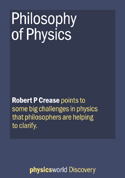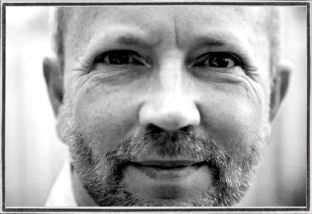
Think about it: Robert P Crease’s new short-form Physics World Discovery ebook is now available to read for free
By Matin Durrani
Avid readers of Physics World will know that we have for many years published a monthly column called “Critical Point” written by Robert P Crease, a historian and philosopher of science from Stony Brook University in New York, in which he examines the interface between physics and the wider culture.
I’ve always felt Crease’s work is interesting but I’m aware that many physicists scoff at the notion of philosophers trying to understand how science works. It’s a waste of time, right?
Following a meal at a vegetarian restaurant round the corner from his apartment in Manhattan earlier this year, I managed to persuade Crease to write one of our new, short-form ebooks that go under the the Physics World Discovery banner. My challenge was for him to explain to physicists just what it is philosophers of physics do – and why their work is important.
You can read Crease’s book Philosophy of Physics, which has just been published, for free in either epub, Kindle or PDF formats via this link. To whet your appetite, Crease has answered some questions about his approach to philosophy and why the book is worth reading. Don’t forget there are plenty of other books in the Physics World Discovery series, ranging from multimessenger astronomy to quantitative finance.
1. What first attracted you into studying the philosophy of physics?
I was in graduate school at Columbia University when a former college roommate – then a budding science journalist – coaxed me to collaborate on stories about physics. These included an article about an accelerator under construction at Brookhaven National Laboratory, which we wrote for the New York Times, and a profile of Sheldon Glashow – who had just then received the Nobel Prize –which we wrote for the Atlantic. While writing these stories I was shocked by the difference between philosophy textbooks’ picture of physics and physics in the field, so to speak. I began to seek a “truer” – OK, loaded term alert – philosophy of physics. What motivated me was the same thing that motivates physicists: the gap between theory and what you see.
2. So what sort of research have you specialized in?
I began by tackling experimentation, because I saw a vast difference between my textbooks’ picture of experiment as something automatic and unproblematic – and the kind of constant tweaking and improvising that I saw watching scientists at work. I tried to understand experiment as like a performance, involving the conception, production, and witnessing of events that give back something more than what’s put into them. How come physicists can thoroughly understand all the elements that go into an experiment – the materials, the instruments, the theories or programming – and yet, when the performance takes place, get back something new? I found that performance is not a suggestive metaphor carried over from the performing arts into scientific inquiry but a true descriptive term. More recently I’ve become interested in what’s called the “New Big Science”, or the research ecology at large materials science facilities.
3. How does your approach differ from those of other philosophers?
Most philosophy of physics is dominated by the language of analytic philosophy, which is interested in epistemology – on the conceptual and methodological difficulties of physics, on how evidence is produced and evaluated, on the logic of scientific inquiry, and on the conceptual structure of its findings. I’m more interested in continental philosophy, which is interested in ontology – on how we know things, and the way of being of what we know. What kind of a thing is the wave function? That’s something solved by description, not simply logic. Continental philosophers are fascinated, too, by controversies, because they are a sign of philosophical issues. Controversies about things like priority or interpretation or whether string theory is scientific indicate that philosophical issues are in play. Such controversies signal that the antagonists each understand something about physics that they cannot yet articulate to everyone’s satisfaction – meaning that exploring these controversies may be deeply revealing about physics itself.
4. How do physicists mostly react to your work?
For the most part, very positive. Once I explain to suspicious physicists that there are different philosophical traditions with diverging interests, styles, and methods – in approaching the topic of time, for instance – it finally seems to click what philosophy does.
5. So what do you say to those physicists who think philosophy of science is a waste of time?
Declaring philosophy a waste of time means declaring physics a waste of time. Interesting, isn’t it, that not two pages after Stephen Hawking declares that “Philosophy is dead” in The Grand Design, he then outlines his own (rather crude) philosophical theory called “model-dependent realism”. That kind of thing always happens when physicists try to escape philosophy; they can’t, they jump right back in. But if I were impatient and not my normal tolerant and helpful self I’d simply hand them this ebook.
6. Why did you write the book?
Because you asked me. I wouldn’t have done it otherwise. I refused at first, remember? But repeated encounters with sceptical physicists convinced me that it was worth writing something that outlined the necessity of doing philosophy of physics.
7. Did you run into any surprises while writing?
Yes. I realized the importance of explaining the differences between philosophical traditions. Not understanding the differences is one reason why many physicists do not understand philosophy. These traditions are stylistically and methodologically divergent, and to outsiders must seem like political parties squabbling over ideologies, or sports journalists arguing about what footballers should have done on the field. But these traditions have distinct perspectives on science in somewhat the way chemists, physicists, and engineers have distinct perspectives on atoms.
8. What do philosophers do again?
They seek to understand, not what physicists know, but how they know it. Physicists are constantly discovering new ways to know things, so philosophers of physics will always have plenty to do.
You can read Crease’s Physics World Discovery book Philosophy of Physics for free via this link. For all titles in the series, please go here.

Guidelines
Show/hide formatting guidelines
this text was deletedwhere people live in harmony with nature and animals</q>
Some text